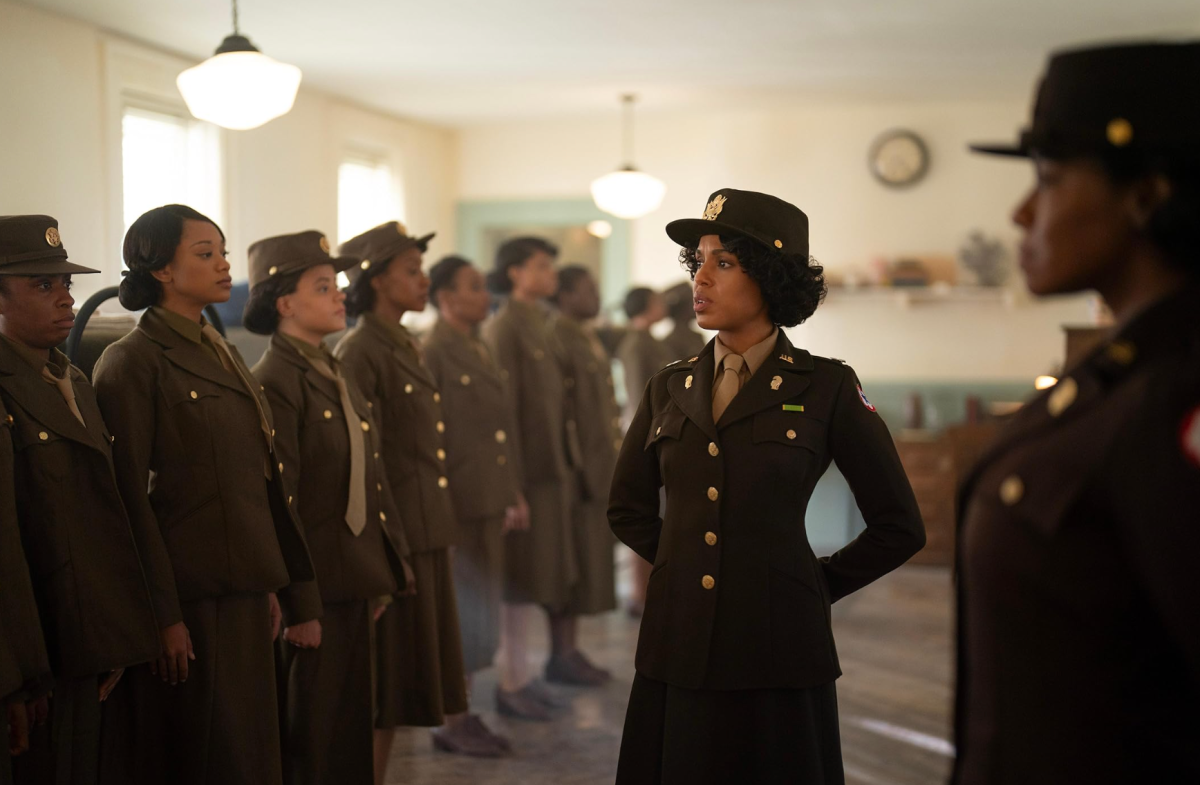
IMDB

Tyler Perry’s “The Six Triple Eight” effectively and beautifully tells the incredible true story of the 6888th Central Postal Directory Battalion, the only all-Black and all-female battalion in World War II. The film follows Lena (Ebony Obsidian) as she enlists in the army after her childhood sweetheart is killed in action. She meets other fellow enlistees as they narrowly get through basic training under the firm Major Charity Adams (Kerry Washington).
Lena’s story is set against the backdrop of a recurring mail freeze in Europe, which prevented U.S. soldiers from sending or receiving letters during WWII. Meanwhile, Major Adams faces the daunting challenge of sorting through 17 million pieces of mail in less than six months. The women find ingenious ways to identify and deliver the mail, ultimately completing the task in less than the six-month deadline.
In full transparency, the first 20 minutes of this film left me feeling utterly lost. The opening battle sequence felt disconnected, introducing an unnamed soldier who never appeared again, effectively diluting any sense of narrative cohesion the film sought to establish. Perry also juggles too many different storylines too quickly — bouncing from the front lines to the White House to the suburbs — making it hard to settle in or truly understand the story initially. He also falls into the trap of dedicating far too much screen time to Lena’s romance that could have been spent unpacking the internal dynamics behind the 6888th’s remarkable feat. However, once the film found its rhythm and became more character-driven, it evolved into something fantastic.
The film is nothing short of excellent. Perry’s writing is genius, as he perfectly balances exploring the service of the women in the 6888th with the personal hardships they faced in a world that refused to recognize their contributions. The characters are written with a depth that skillfully and memorably forges a personal connection with the audience. It is also refreshing to hear writing that reflects genuine relationship dynamics between Black women, showcasing the reality of intersectional struggles between women from diverse socio-political and economic backgrounds.
The acting is also incredible and authentic, spotlighting female solidarity to emphasize the historical weight of sisterhood and its contributions. Kerry Washington, in particular, gives an electrifying and frankly Oscar-worthy performance as the battalion commander Adams, the country’s highest-ranked Black female officer during the war. Washington’s portrayal explores leadership and how it can manifest even in times of extreme racism, serving as a worthy tribute to the remarkable real-life Major Charity Adams. Adams’ passionate monologue to General Halt (Dean Norris) at the end of the film, in which she demands respect for the battalion’s work, is an empowering moment full of soul.
What the film lacks in narrative cohesion, it undoubtedly makes up for in heart. Perry’s exploration of what true heroism and patriotism entail, particularly in the face of blatant racism, gives this story a timeless appeal. “The Six Triple Eight” is not only a well-written and personally impactful film — it is an overdue tribute to the 6888th themselves. Their contributions were vital to the greater U.S. war effort, yet their service has been overlooked since the battalion’s creation.
At the end of the film, when the battalion receives recognition in the form of salutes from the soldiers who had previously denied them any sense of distinction, the audience cannot help but rejoice alongside them. Their triumph serves as a reminder of the sheer dedication and persistence these women embodied. The film does not just tell the story of these 6888th — it honors their legacies in a way that resonates with viewers.